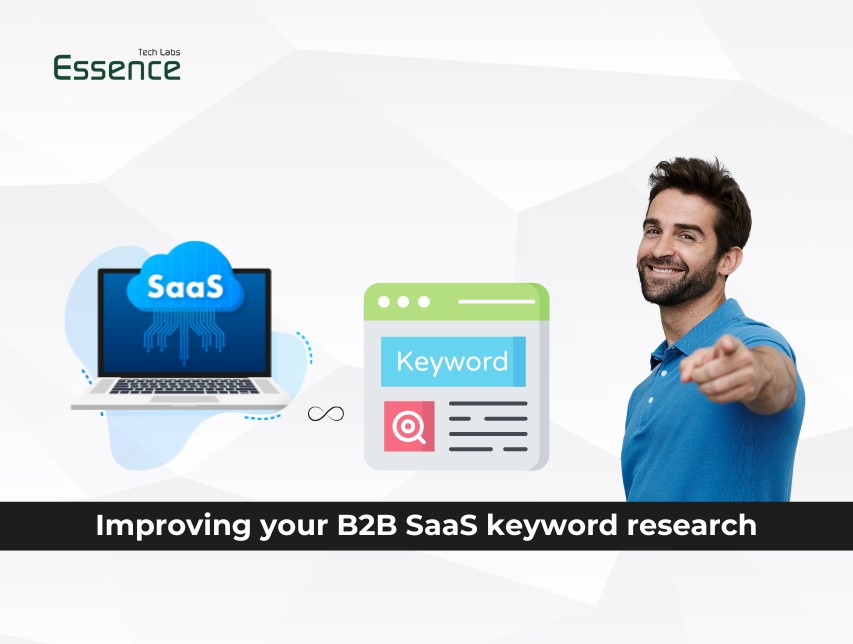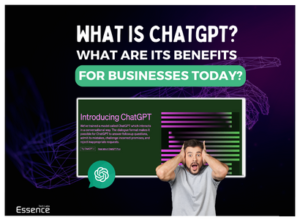
Improving your B2B SaaS keyword research
Introduction
In the highly competitive landscape of B2B SaaS marketing, effective keyword research is the cornerstone of a successful digital strategy.
For Essence Tech Labs, a premier software development company in Canada, understanding and utilizing the right keywords can significantly boost visibility, attract quality leads, and drive conversions.
This comprehensive guide will explore best practices for B2B SaaS keyword research, helping you uncover high-value keywords that resonate with your target audience.
We’ll also delve into aligning your keyword strategy with the buyer’s journey, leveraging competitive analysis, and creating content that converts.
The Importance of Keyword Research in B2B SaaS Marketing
Keyword research is not just about finding the most popular search terms.
It’s about understanding the language your potential customers use when searching for solutions to their problems.
For Essence Tech Labs, this means targeting keywords related to software development, cloud solutions, CRM systems, and more.
Identifying Customer Problems and Solutions
One of the primary tasks in marketing is to pinpoint your target audience’s problems and present your software as the ideal solution.
Prospects are often more interested in solving their problems than in the specific features of your product. Here’s how to approach this:
Common Problems and Keywords
Reliable and Secure Cloud Storage
- Solution Providers: Dropbox, Google Drive
- Keywords: “best cloud storage,” “most secure cloud storage,” “affordable cloud storage,” “cloud storage for business”
Customer Insights via Polls and Surveys
- Solution Providers: Survey Monkey
- Keywords: “best survey creation apps,” “market research tools,” “audience insights tools,” “survey software”
CRM and Marketing Automation
- Solution Providers: MailChimp, Salesforce
- Keywords: “email automation tools,” “best CRM software,” “lead tracking software,” “CRM for small businesses”
User-Friendly Accounting Solutions
- Solution Providers: QuickBooks, FreshBooks
- Keywords: “best business accounting software,” “time tracking software,” “invoice management software,” “small business accounting solutions”
Flexible Communication Software
- Solution Providers: Slack, GoToMeeting
- Keywords: “team communication software,” “video conferencing tools,” “best collaboration tools,” “remote team communication”
Tailoring Keywords to Customer Needs
Selecting keywords that directly connect to your customers’ needs is crucial. Remember, prospects might not initially think of your specific solution.
For example, if you offer market research tools, broader keywords such as “market research techniques” might be effective.
The goal is to anticipate the questions and concerns of your potential customers and provide answers through your content.
Mapping Keywords to Buyer’s Journey Stages
Understanding the buyer’s journey is critical for effective keyword targeting.
Different stages require different keyword strategies, ensuring that you’re addressing the needs of prospects at each stage.
Awareness Stage
At this stage, prospects are not yet considering a purchase. They are seeking information to understand their problems better. Keywords should guide them to helpful content, such as blog posts, white papers, or webinars.
Example: If you offer WordPress security solutions, target keywords like “protect WordPress site from hackers,” “WordPress security tips,” and “how to secure WordPress.”
Consideration Stage
Prospects are now evaluating potential solutions, including competitors. Keywords at this stage should compare different solutions or offer detailed insights into specific options.
Example: “Brand X vs. Brand Y: Best CRM Software” or “Top alternatives to Brand X CRM.”
Conversion Stage
In this stage, prospects are ready to make a purchase. They use keywords that indicate buying intent, such as “affordable,” “best deals,” and “where to buy.”
Example: “Buy affordable CRM software,” “best deals on email automation tools,” “where to buy cloud storage solutions.”
Loyalty Stage
Even existing customers may explore other options. Keywords targeting this stage should address customer retention and competitor analysis.
Example: “Brand X customer service reviews,” “Brand Y loyalty program benefits,” “how to switch CRM providers.”
Leveraging Competitive Analysis
Analyzing your competitors provides valuable insights into your keyword strategy. Here’s how to effectively spy on competitors’ keywords:
Methods for Competitor Keyword Analysis:
- Google Ads and Search Results: Identify who is advertising for popular keywords in your niche. This reveals aggressive keyword strategies.
- Competitor Websites and Content: Analyze blog posts, videos, and other content for keyword ideas.
- Keyword Tools: Use tools like Google Keyword Planner, Keyword Spy, SpyFu, or Alexa’s Competitive Analysis Tools to uncover competitors’ keywords.
- Direct Competitor Research: Manually review competitors’ websites to see which keywords they are optimizing for SEO and PPC campaigns.
Advanced Competitive Analysis Techniques
- Content Gap Analysis: Identify the keywords and topics your competitors are ranking for that you are not. This can uncover opportunities for new content.
- Backlink Analysis: Look at the backlinks your competitors are getting. These can provide insights into their keyword strategy and content focus.
- Traffic Analysis: Use tools like SimilarWeb or SEMrush to understand where your competitors’ traffic is coming from and which keywords are driving the most traffic.
Tracking and Refining Your Keyword Strategy
Keyword research is not a one-time task; it requires continuous monitoring and refinement. Keywords fluctuate in competitiveness and popularity. Regularly track your keyword performance to make necessary adjustments.
Tracking Tools and Techniques
- Google Analytics: Use tools like In-Market Segments Report, Site Search Report, and Referrals Report to analyze keyword performance.
- A/B Testing: Consistently perform A/B tests on ads to determine the best-performing keywords.
- Keyword Performance Monitoring: Regularly check keyword rankings and adjust strategies based on performance data.
Implementing a Dynamic Keyword Strategy
For Essence Tech Labs, a dynamic keyword strategy is essential to stay ahead in the Improving your B2B SaaS keyword research. Here are some advanced practices to enhance your keyword research:
Long-Tail Keywords
Long-tail keywords are less competitive and often more targeted, leading to higher conversion rates. Identify specific phrases that potential customers might use when looking for your solutions.
Example: Instead of “CRM software,” use “best CRM software for small businesses,” “affordable CRM for startups,” “CRM with email automation.”
Semantic Keyword Research
Semantic keywords relate to the primary keyword and provide a broader context. This helps capture a wider range of search queries and improves SEO.
Example: For the primary keyword “best cloud storage,” related semantic keywords could include “secure cloud storage for businesses,” “cloud storage for remote teams,” “affordable online storage solutions.”
User Intent Keywords
Understanding user intent behind search queries helps in targeting the right keywords. Focus on the purpose of the search – informational, navigational, or transactional.
Example: For informational intent, use keywords like “how to choose the best CRM software,” “CRM benefits for small businesses.” For transactional intent, use “buy affordable CRM software,” “best deals on CRM solutions.”
Enhancing Keyword Research with Advanced Tools
Utilize advanced keyword research tools to streamline and optimize your process. Some recommended tools include:
- SEMrush
SEMrush offers comprehensive keyword research features, including keyword difficulty analysis, competitor analysis, and keyword gap analysis. It provides valuable insights into keyword trends and helps you identify high-potential keywords.
- Ahrefs
Ahrefs provides detailed insights into keyword rankings, search volume, and competitor keywords. It also offers a content gap analysis feature to identify missing keywords. With its extensive backlink database, Ahrefs helps you understand the link-building strategies of your competitors.
- Moz
Moz offers keyword suggestions, SERP analysis, and rank tracking. It also provides valuable insights into keyword difficulty and potential. Moz’s Keyword Explorer tool helps you discover new keyword opportunities and optimize your existing content. - Google Keyword Planner
Google Keyword Planner is essential for PPC campaigns. It helps identify relevant keywords and provides search volume data. This tool is particularly useful for understanding the competitiveness of keywords and planning your AdWords campaigns.
Creating Content Around Keywords
Once you have identified the right keywords, creating valuable content around them is crucial. Here’s how to optimize your content for Improving your B2B SaaS keyword research:
Blog Posts:
Create informative blog posts addressing specific problems and solutions. Use keywords naturally within the content to improve SEO.
Example: A blog post titled “Top 5 CRM Software for Small Businesses” with keywords like “best CRM software” and “small business CRM solutions.”
White Papers and E-Books:
Offer in-depth guides and resources that address industry challenges. These can be gated content to capture leads.
Example: An e-book titled “The Ultimate Guide to Secure Cloud Storage” targeting keywords like “secure cloud storage” and “cloud storage solutions.”
Webinars and Videos:
Visual content like webinars and videos can engage your audience and provide valuable information. Optimize titles and descriptions with relevant keywords.
Conclusion
Improving your Improving your B2B SaaS keyword research is a continuous process that requires a strategic approach.
By identifying customer problems, Improving your B2B SaaS keyword research mapping keywords to the buyer’s journey, leveraging competitive analysis, and creating valuable content, Essence Tech Labs can enhance its online presence and attract qualified leads.
Great! Adding keywords like “digital marketing company in Canada” will help target relevant searches and enhance your SEO strategy for Essence Software. Remember to integrate these keywords strategically across your content and track their performance regularly. If you need further assistance with optimizing your SEO strategy, feel free to ask!
Essence Tech Labs is Canada’s Best Digital Marketing Agency providing cutting-edge solutions in Offshore software development ,web development , Mobile app development ,chatbot development, AI-powered chatbots, product development, tech consulting,and digital marketing. With a team of skilled professionals and a passion for innovation, we empower businesses to achieve their goals in the digital landscape.





